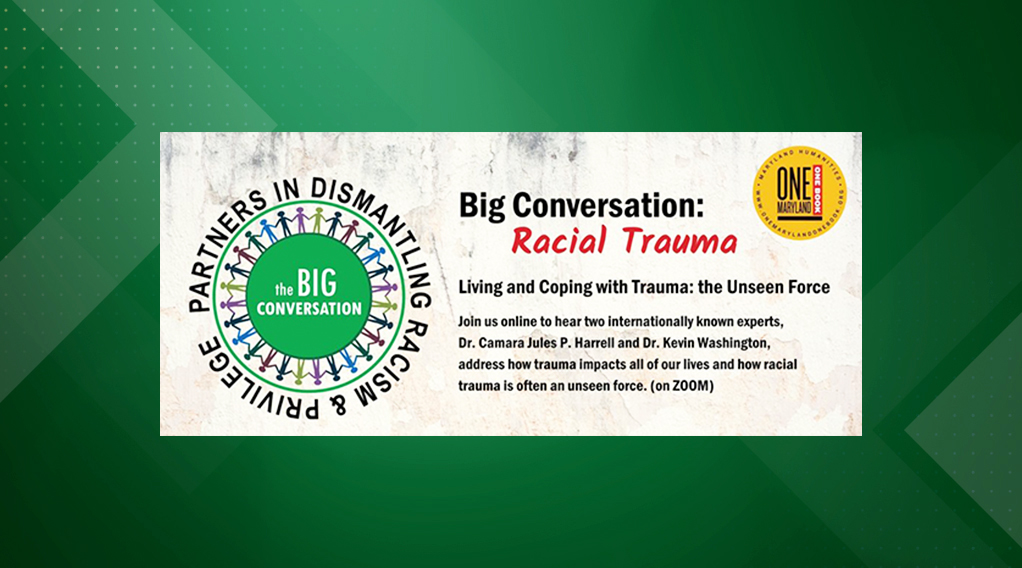Southern Maryland’s ‘Big Conversation’ Participants Tackle Racial Trauma, Share Solutions for Healing

'We Commit to Work for the Change We Seek'
Two international experts on trauma recently spoke to the Southern Maryland community on the psychological wounds and ripple effects that racism and racial trauma inflict on individuals and their communities—and the need for healing at the personal and collective level.
“Living and Coping with Trauma: The Unseen Force” was the latest in a series of community conversations presented by the Big Conversation: Partners in Dismantling Racism and Privilege in Southern Maryland, of which the College of Southern Maryland (CSM) is a member. More than 250 community members registered for the Sept. 11 event hosted by the Calvert County Library via Zoom.
Diane Davies, chairperson of the Big Conversation, kicked off the panel’s presentation by introducing the topic, which grew out of participants’ requests from last year's Big Conversation forum, “Many Wounds to Heal” and the events and revelations of dealing with COVID.
“We realized that because of the pandemic, most of us have experienced some degree of trauma,” she said. “But some have experienced racial trauma daily and for generations... Understanding the impact of trauma and making changes begins by listening deeply to each other, our stories, and looking into ourselves, examining our systems and finding answers.”
Panelists then shared their insight into the issue. Dr. Camara Jules P. Harrell, professor of clinical psychology at Howard University, spoke about the origins of racial trauma and how we need to address it on multiple levels in order to heal.
“Trauma can be brought into our lives both on a conscious and unconscious level, impacting us without our knowledge,” he said. He explained that trauma can come from racism and individual experiences at an individual, cultural or structural level. “When we talk about treatment, interventions must speak to each of these levels that impact the individual.”
Dr. Kevin Washington is an associate professor and head of sociology and psychology at Grambling State University, and he talked about the cultural trauma experienced by Black Americans and its myriad effects.
“If we examine the Afrikan enslavement that took place over 400 years, what do we think would have been the impact on those that were enslaved, on generations of people who did the enslaving?” he asked. “What are the current-day effects that we can see that suggest that there are some elements of trauma that exist? And what can be done about it?”.
After the panelist presentations, Nancy Briggs, a member of the Big Conversation steering committee, kicked off the discussion by asking, “How do white people unknowingly contribute to this trauma, and what can we as white people do to improve the daily experiences of trauma for people of color?”
The event concluded with several testimonials from people in the community, and the opportunity for attendees to break into small, facilitated groups to share what they learned, discuss the impact of trauma and search for solutions.
Dr. Trenace Richardson, interim associate vice president of Human Resources and director of the Organizational Development and Learning Institute, is CSM’s representative in the Big Conversation community partners work group. She shared the importance of CSM’s involvement in this event and the organization, overall.
“The College of Southern Maryland is so proud to be a part of this monumental event that takes place annually,” she said. “As partners in the Big Conversation, we have provided support by way of people, ideas, and resources because we believe in the work of this organization. A major part of our mission and values is to respect the contributions and differing abilities of everyone, providing space for all. Our Board of Trustees expressed a strong commitment to work for the change we seek in our college and our communities. Partnering with this event and the other community partners in this organization help us fulfill that commitment.”
 my.CSMD
my.CSMD